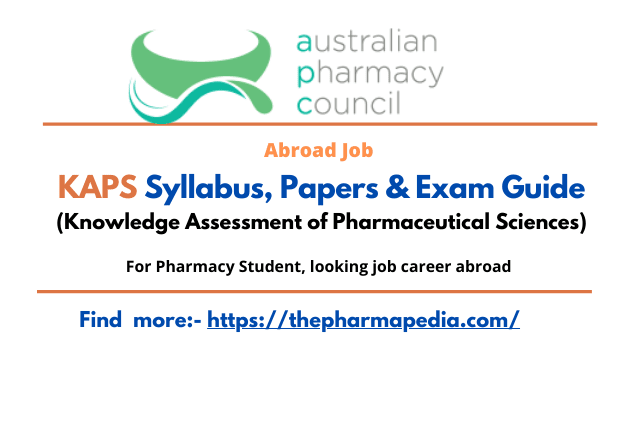KAPS (Knowledge Assessment of Pharmaceutical Sciences) PAPER
KAPS tests by APC is conducted to check your knowledge and understanding of pharmaceutical sciences. Passing it confirms that you know enough to practise safely and effectively in an Australian setting.
The KAPS exam consists of 2 papers:
- Paper 1st: Pharmaceutical chemistry, pharmacology and physiology
- Paper 2end: Pharmaceutics and therapeutics; 100 MCQ; 120 minutes times
Passing Marks:
- To pass the exam, you need:
- a mark of at least 50% in all subsections/subjects of the exam
- an overall mark of at least 50%.
- If you passed 1 paper of the KAPS, you will have 2 years to pass the unsuccessful paper. If you do not pass this paper within 2 years, you’ll need to register to sit both papers again & also need to pay fee again.
No of MCQ Question & Time
- Total no of MCQ :100 MCQ in each paper
- Time: 120 minutes times for each paper
- There will be interval of 60 minutes between both paper 1st and paper 2end
KAPS SYllabus
Paper 1: Pharmaceutical chemistry, pharmacology and physiology
Pharmaceutical chemistry topic of Paper 1:
1. Organic chemistry
- Nomenclature
- Drug class recognition
- Reaction types
- Functional group reactivity
- Drug stability
- Acid-base reactions
2. Stereochemistry
- Nomenclature
- Optical activity
- Geometric isomerism
- Conformation
3. Physical and inorganic chemistry
- Kinetics
- Acid-base reactions
- Phase equilibria
4. Analytical chemistry
- Spectroscopy
- Redox reactions
- Assay techniques
- Diagnostic agents
5. Biochemistry
- Nomenclature
- Structures
- Biochemical classes
- Thermodynamics
- Biochemical pathways
6. Structure-activity relationships
- Relationship between a chemical or 3D structure and its biological activity
7. Medicinal chemistry
- Structure-activity relationships
- Drug presentation and delivery
- Drug formulation and stability
- Drug metabolism
- Mechanism of drug action
- Modern drug development
- Absorption, distribution and elimination of drugs
8. Drug metabolism
- Breakdown and conversion of medicines through regularly occurring bodily process, leading to active ingredients and by-products of the original medicine
Pharmacology and physiology topics of Paper 1
1. Biochemical pharmacology
- Principles of drug action
- Drug interactions
- Receptor pharmacology
- Autonomic transmission
- Endocrine pharmacology
- Cardiovascular pharmacology
- Anti-inflammatory agents and analgesics
- Antibiotics
- Diuretics
- Local and general anaesthetics
- Vitamins
- Drugs affecting nutritional and metabolic function
- Drugs affecting the central nervous system
2. Systemic pharmacology
- The mechanism of drug action as it relates to specific organs and disease states
3. Chemotherapy
- Antibacterial drugs
- Antiviral drugs
- Antifungal drugs
- Antiprotozoal drugs
- Anthelmintic drugs
- Anticancer drugs
4. Toxicology
- Common side effects
- Signs of toxicity
- Mechanism of toxicity
5. Pathophysiology
- Alteration of physiological processes by drugs or disease states
6. General physiology
- Normal bodily functions including but not limited to the central nervous, digestive, cardiovascular, lymphatic, nervous, respiratory, urinary, endocrine and reproductive systems and their integration
- Blood and other body fluids
Paper 2: Pharmaceutics and therapeutics
Pharmaceutics topic of Paper 2
1. Physical pharmacy
- Solvents
- Types of preparation
- Solutions
- Suspensions
- Emulsions
2. Biopharmaceutics
- Dissolution
- Drug absorption
- Bioavailability and bioequivalence
- Drug interactions with a biopharmaceutical basis
3. Pharmacokinetics and pharmacodynamics
- Biological half-life
- Elimination rate constants
- Apparent volume of distribution
- Clearance
- Steady state considerations
- Drug protein binding
- Drug metabolism
- Drug interactions
- Pharmacogenetics
- Relevant calculations
4. Pharmaceutical microbiology
- Preservation
- Antimicrobial agents
- Sterilisation technology
5. Formulation
- Formulation of drugs for various routes of administration
- Parenteral dose forms
- Controlled release preparations
- Evaluation of particular dose forms
6. Dose forms, including extemporaneous preparation
- Drug products
- Constituent drug substances
- Combination compounded products for use via various routes of administration
Therapeutics topic of Paper 2
1. Calculations
- Dilutions
- Percentages
- Densities
- Sensitivity of balance
- Proportions
- Isotonicity
- Milliequivalents and milliosmoles
- Buffers
- Dose calculations from body weight or surface area
- Stability
2. Posology and dose determinations
- Appropriate dosages of common medications
- Dosage regimens of common medications
3. Medicine choice
- Demonstrating an understanding of the clinical processes used for choosing the most appropriate drug for the presenting patient and their condition
4. Surgical dressings, applications and associated drug delivery systems
- Drug choices for surgical dressings
- The use of and choices for surgical dressings
5. Adverse reactions to drugs
- Adverse reactions for drugs
- Relevant patient counselling and advice
6. Drug interactions
- Drug interactions
- Relevant patient counselling and advice
6. Drug information
- Using information sources to find drug and health information relevant to conditions and disease states
6. Managing minor ailments
- Non-prescription prescribing
- Diagnosing minor illness
- Rational over-the-counter product selection
- Over-the-counter drug information
KAPS Pharmacist Syllabus Download pdf
KAPS exam paper
- Download Paper 1 Sample 1 (35 pages PDF)
- Download Paper 1 Sample 2 (40 pages PDF)
- Download Paper 2 Sample 1 (34 pages PDF)
- Download Paper 2 Sample 2 (39 pages PDF)
Read more…
Procedure to become Pharmacist in Australia- Step by Step


Comments are closed